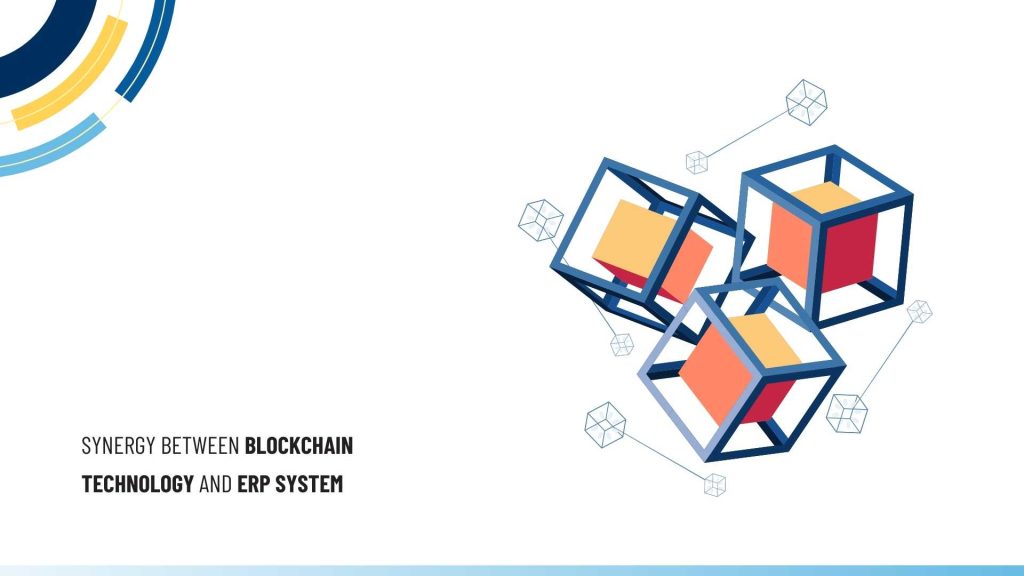In the dynamic realm of contemporary business, the convergence of two revolutionary technologies, Blockchain and ERP, has emerged as a pivotal catalyst for transformative change. As organizations strive to navigate the intricacies of modern enterprise management, the synergy between blockchain technology and ERP has garnered significant attention for its potential to reshape traditional paradigms.
This synergy, where blockchain’s decentralized and immutable nature converges with the centralized efficiency of ERP systems, promises a harmonious integration that amplifies transparency, security, and operational efficacy.
We delve into the intricacies of this powerful alliance, shedding light on how the amalgamation of blockchain and ERP not only addresses existing challenges but also heralds a new era of innovation and resilience in the business landscape.
Understanding Blockchain and ERP:
Before delving into their collaboration, let’s briefly explore the individual strengths of blockchain and ERP.
Blockchain Technology:
Decentralization: Blockchain operates on a decentralized network, eliminating the need for intermediaries and fostering trust among participants.
Immutability: Once information is recorded on the blockchain, it cannot be altered or tampered with, ensuring data integrity.
Transparency: All participants in a blockchain network have access to the same information, promoting transparency and accountability.
ERP (Enterprise Resource Planning):
Centralized Data Management: ERP systems centralize various business processes, such as finance, HR, and supply chain, providing a unified platform for data management.
Process Optimization: ERP streamlines workflows, automates routine tasks, and enhances operational efficiency.
Data Integration: ERP connects different organizational departments, enabling seamless communication and data sharing.
Blockchain Technology Features
ERP Features
- Decentralization
- Immutability
- Transparency
- Security through Cryptography
- Consensus Mechanisms
- Smart Contracts
- Distributed Ledger
- Permissioned and Permissionless Networks
- Anonymity
- Interoperability
- Centralized Database
- Integrated Modules
- Real-time Data Access
- Automation of Business Processes
- Scalability
- Customization
- User Authentication and Authorization
- Reporting and Analytics
- Regulatory Compliance
- Cross-Departmental Integration
The Synergy Unveiled:
Let’s explore how integrating blockchain technology and ERP can lead to a synergistic relationship, offering businesses a competitive edge.
Enhanced Data Integrity:
By integrating blockchain with ERP, businesses can ensure the immutability of critical data. Transactions recorded in the ERP system can be cryptographically secured on the blockchain, preventing unauthorized access and maintaining data integrity throughout the supply chain.
Improved Traceability and Transparency:
Blockchain’s transparent and traceable nature complements ERP’s centralized data management. This synergy allows for real-time tracking of products, from manufacturing to delivery, providing stakeholders with a comprehensive view of the entire supply chain.
Smart Contracts for Automated Processes:
Smart contracts, self-executing contracts with the terms of the agreement directly written into code, can automate various processes within an ERP system. For instance, payment terms, procurement, and compliance checks can be executed seamlessly, reducing the risk of errors and enhancing operational efficiency.
Decentralized Decision-Making:
The decentralized nature of blockchain technology facilitates collaborative decision-making. ERP systems integrated with blockchain allow multiple parties to access and update information simultaneously, promoting a more democratic and efficient decision-making process.
Supply Chain Resilience:
Blockchain’s decentralized ledger ensures that supply chain data is not vulnerable to a single point of failure. In case of disruptions or cyber threats, the distributed nature of blockchain can safeguard critical information, ensuring business continuity.
Conclusion:
The synergy between blockchain and Acumatica ERP represents a formidable alliance that holds immense promise for businesses navigating the complexities of modern enterprise management.
The incorporation of blockchain’s decentralized, transparent, and secure features into Acumatica ERP’s robust system amplifies the potential for data integrity, traceability, and automated processes.
As organizations strive for heightened efficiency, resilience, and innovation, embracing this collaborative approach positions them at the forefront of technological advancement.
The combined strength of blockchain and Acumatica ERP addresses existing challenges and opens doors to new possibilities, fostering a future where businesses can thrive with unprecedented levels of trust, transparency, and operational excellence.

Vijay comes with a vast experience in ERP and enterprise solutions space with about 20 years of experience in various packaged application like Acumatica, SAP, Orion, Salesforce.com, SugarCRM and, SalesLogix.

